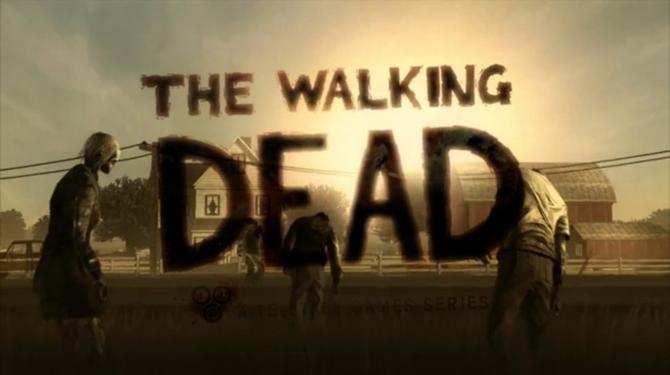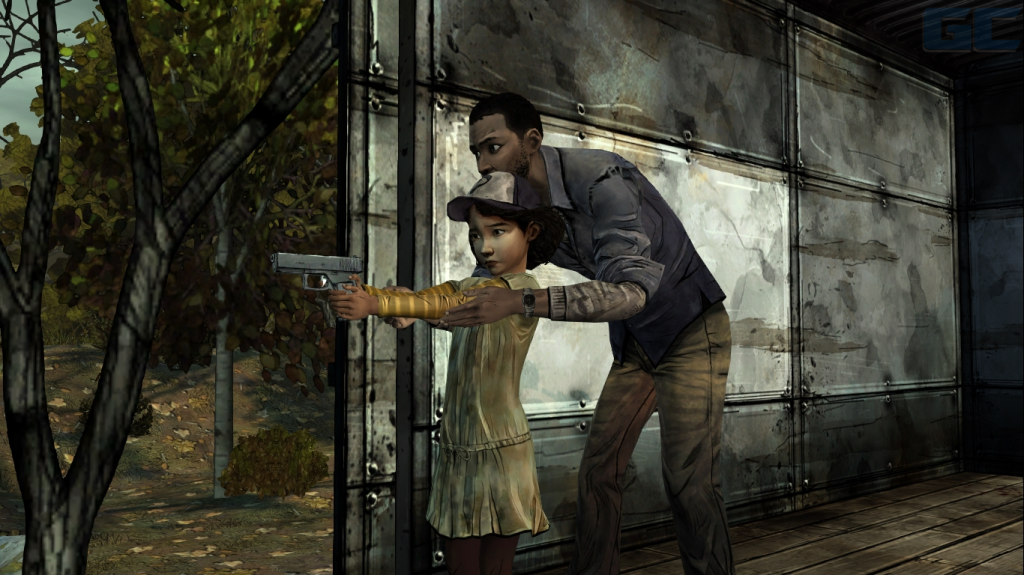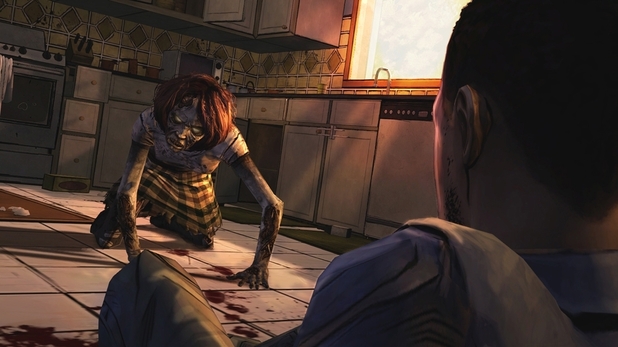Last updated on April 9, 2013
Telltale’s Walking Dead is all about making hard decisions. Who do you save? Who gets to eat? Who to put out of their misery, etc. As with Dishonored and Mass Effect 3, I felt inclined to ask if the choices given allow you to play as Jesus would. In short? As with those previously mentioned titles, the results are a messy mix of yes and no.
Being that the game is approximately 90% story, it’s hard not to spoil it. So, I’m going to talk about The Walking Dead’s decisions as isolated experiences, leaving out proper names and a lot of the context. The two notable exceptions are Lee (the playable character) and the little girl he protects, Clementine. Also, noteworthy is the fact that the content of the game is truly not for everybody. I wouldn’t play this game with my wife around as she gets creeped out by cartoon demons. There is a lot of zombie gore and disturbing situations meant for mature audiences despite the comic book art style. And I wouldn’t recommend it to anybody who takes issue with F-bombs. So if you have a problem with me suggesting Jesus would take interest in a game with said content, this is your chance to opt out.
The Setup
We’re first introduced to our character in the back of a cop car en route to downtown Atlanta where he’s to be put away for a crime of passion. The police officer driving the car talks to Lee and asks him a few questions. Our options pop-up on the screen with a time-bar that tells us our response window is shrinking. Since I’m trying to play like Jesus, I avoid all the responses that include bitterness and vulgarity. I also answer as honestly as I can, speaking for a man who’s story I don’t yet know. This is how we learn Lee’s story: by answering for him and deciding where to let his emotions and decisions take him. We choose how he responds, yet it’s a feigned control. He, like us, is a man in the middle of a story with a pre-existing trajectory. We just get to decide how it gets there: with four-way option wheel responses, brief quicktime sequences, and occasional behind-the-barrel action sequences. But most of our decisions come down to choosing one of those four face-button-assigned options.
Lee meets Clementine when she’s hiding from her zombified baby sitter. Lee decides that his skills as a guardian are likely better than a zombie and he takes “Clem” under his wing as they seek shelter from the impending horde. What ensues for the next five episodes is a deluge of despair with tiny pinholes of hope through which you carve out the best path you can.
Choices, Choices
Drew Dixon called the decisions in the Walking Dead illusions of choice. The trajectory of some decisions in the game are predestined. But the veil is thin on which calls are defined for you and which ones truly belong to you. The ultimate importance is that you own each and every action. So do yourself a favor and let your axe fall where it may. Lee isn’t a man full of the Holy Spirit. His imagination isn’t open to the supernatural. He’s scared for himself and for Clementine. So all his options are ultimately carnal and caught between a rock and a hard place.
Lee has to make a litany of impossible choices, often in a few seconds or less:
1. I can only save one of two people. Who do I choose?
2. This person is trapped. Do I sever a limb to (possibly) save them (granted that they don’t bleed-out) or do I leave them to the zombies?
3. A person is infected and will turn into a zombie. Do you put them out of their misery or let them turn into a walker?
4. Repeat number three. Person is sick and elderly.
5. Repeat number three. Person is a child.
6. Everybody is starving. Who gets food? The adults who do all the labor? Or the children?
7. Your friend just murdered your other friend. What do you do with them?
8. Your friend wants to murder your other friend. How do you keep both alive?
9. A creepy stranger offers help. Do you trust them with your life?
10. Repeat number seven. Do you trust them with Clem’s life?
11. Nazi-like survivalists have what you need and don’t want to give it to you. How do you get it from them? With force?
So, What Would Jesus Do? Right?
The obvious reality is that these questions are carnal, gritty, and don’t provide a “biblical resolve.” They don’t leave room for a prophetic or miraculous imagination that sees a truly better way. While that may be to the Walking Dead’s detriment in one fashion, in another, they express the worldview of the creators: that the world can be a dark and despairing place where terrible things happen and “it is what it is.”
So, no. You can’t play as Jesus in these options. Jesus would find a way to save multiple people in mortal peril (as with when the disciples were about to die in a storm). He would multiply the food so everybody was provided for (as in the feeding of the four thousand, and later with the feeding of the five thousand). He would be able to keep everybody from death and the grave. And if they did die in the first death, he wouldn’t let their body be re-animated in anything less than it’s glorified resurrected body.
This probably points out the obvious. You’re playing a freaking videogame. And you’re not playing as Jesus. You’re playing as Lee Everett, convicted murderer with many flaws, faults and deficiencies. Yet, somehow, we’re also playing as us, through the limited choices that are given to us. So, the real question is if the questions let us do the best that we can do? To that, I say yes. In as much as we can make decisions that are “right in our own eyes.” You’re even given the chance to defend the choices. Still none of that feels very Jesus-like.
Yet still, I suggest that there is a Christ-like component. Why?
Dying to Self
Clementine is probably the most important part of the game. Why? Because Lee learns what it means to die to himself daily for her benefit. Every decision he makes (you make) is for her benefit and protection. He has to teach her how to survive and somehow retain his goodness (“humanity” as some might call it). There’s a lot that could be said on the lengths Lee takes to keep Clem alive and as mentally healthy as one can keep an 8-year-old in a zombie apocalypse. But I’ll just leave it at the theme of self-denial as to preserve the story for those who have yet to play it.
If you want more detail on what it looks like and don’t mind it being spoiled, Steven Sukkau most eloquently summed it up.
Final Answer
So no, you are not empowered to truly save people from death and make decisions in a way that Jesus would. But you are able to walk a Christ-like path, one of self-denial and the noblest of purpose: the benefit of another, offering your strength to lift up the weak.



